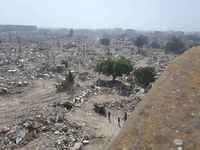Douar Wasti, Casablanca: demolitions and massive evictions
On Friday 21 September, 2018, a contingent of about 2,000 police, military and other forces of order erupted in the Douar Wasti district, at the centre of the Ain Sbaa coastal industrial area of Casablanca, to evict the entire district within a few hours.
Over 1,300 habitations were demolished by bulldozers, and the inhabitants, more than five thousand, including a large number of children, were very quickly forced to collect their belongings, and put them together by the roadside.
Negotiations, which had been taking place for several months, had been interrupted unilaterally by the government after they had offered the residents land in open country for them to build on, without, however, providing any of the financial support that is often offered to the owners of so-called “shacks”, that is, unregulated, self-constructed homes on occupied, or contested, land.
As often happens in many re-housing areas, a transfer far from the city will mean for many, loss of work and access to services, as well as the interruption of their networks of relationships – in short, the end of their relations with the city.
Since 2004 the Moroccan government has supported an ambitious programme called Villes Sans Bidonvilles (cities without shantytowns ) which is claimed will eliminate tens of thousands of self-built homes in Casablanca in less than twenty years. The “zero shacks” target to be reached by 2020 has been followed up with large scale evictions and forced transfers, which inevitably hit the weakest sector of the population, impoverishing them further, while hiding them far from the city.
For most of the poorest residents, in fact, a self-built home near sources of income (factories, markets, the port, apartments needing cleaners) is often their only resource, won at the cost of years of work. Besides, the close relationships that are created for years within self-built districts, guarantee family and friendship links, reciprocal social support, including economic networks that provide support for childcare. For many of them, a transfer means having to start this course of adjustment all over again, as can be seen in new areas like Hay Nassim , where thousands of former inhabitants of the old Medina, in the city centre, have been re-housed.
The so-called “ informal areas” that have been, or are to be, demolished, are called karien, an Arabic form of the French word carrière , road, or douar , village. Among these are often included living quarters that were originally planned, like the El Hank district in the southern corner, which merely found itself in a area that could be better exploited economically in another way. Even parts of the city centre such as the area near the big Hassan II mosque, have been considered as “shanty towns ” on a number of occasions, and demolished, despite their historical and symbolic value.
The families evicted from Douar Wasti had been settled in the area (since the 1920s) and the regularisation of the area had also been under negotiation for years, for its transformation into a regular district, a hay , by means of a development project for which finance had already been set aside. The Villes Sans Bidonvilles project has interrupted this process, with a typical neoliberal appropriation of urban dwelling places.
Located near the Ain Diab train station, and surrounded by higher status residential areas, Douar Wasti has been demolished to make way for new constructions, hotels and flats for higher social classes. The inhabitants are justly furious against the government, and the monarchy, that have cancelled all their previous promises and negotiations.
The eviction was violent, and terrorised many people: above all, some recalled that they’d noticed snipers in nearby buildings, ready to fire on the crowd in the case of a revolt. Afterwards, they’ve camped in thousands in front of the ruins, eating and sleeping in the street, hoping that someone will be interested in their case. For the moment, very few media outlets have announced this news, as they’re probably frightened at the possibility of government repression.
One woman who had been evicted said, “ Our constitution talks about dignity and the rights of citizens, but instead, under the pretence of improving the situation, they throw us in the street. This is mafia, vendetta and nothing to do with our loyalty to the king.” “We haven’t got anything against the king, but this time he’s gone too far “, said one youth with a child in his arms.
Le Traducteur Volontaire pour le droit au logement sans frontières de l'IAI qui a collaboré à la traduction de ce texte est :
Commentaires
%login_link_starAuthentifiez vous ou créez un nouveau compte utilisateur pour commenter.




